'The 7/7 London bombings made me feel helpless'
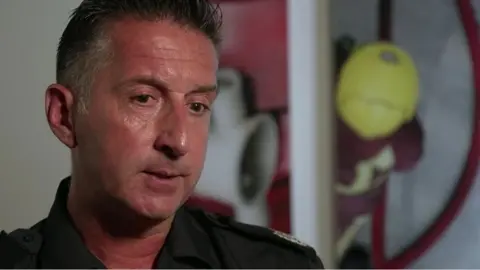 BBC
BBC"You join this job in order to save life... you don't join this job to feel helpless. Even though it's 20 years, it's still very real for me," says firefighter Paul Osborne.
On 7 July 2005, a series of bombs was detonated on London's public transport system during the morning rush hour, killing 52 people and injuring more than 770.
On the day, Mr Osborne's crew was the first to go down into the London Underground tunnel at Aldgate station.
"I remember being down there and just crying out for first-aid kits," he said. "We had so many people that we needed to look after."
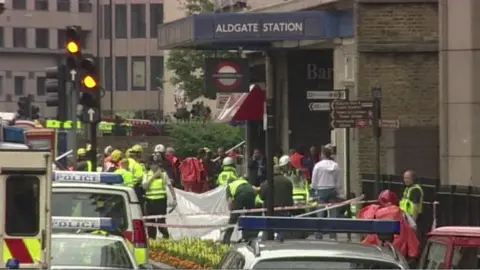
Mr Osborne, who is now a group commander with the London Fire Brigade, said he remembered heading towards the bombed train and being met with a "sea of people" coming towards him.
"Going down there... the side of the Tube train is literally ripped open like a baked bean tin.
"I remember this senior officer coming down and saying: 'This isn't just an isolated incident, this is happening all across London, you need to check for secondary devices.'"
Three of the blasts happened on the London Underground in the vicinity of Aldgate, Edgware Road and Russell Square stations. The fourth device exploded at 09:47 BST on a bus that had been diverted via Tavistock Square.
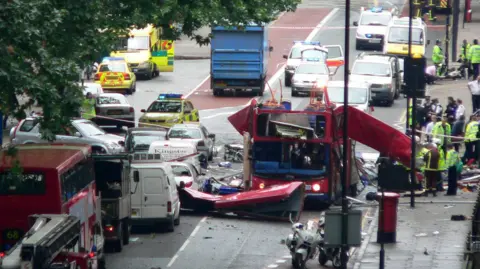 Toby Mason
Toby MasonMr Osborne reflected on how the father of a woman who died during the bombings thanked him for the respect he showed his daughter.
"I think being in the emergency services is about service, and it's about supporting people on their worst day, but it is about saving people's lives," he said.
'I wasn't able to save everyone'
"And unfortunately on that day, we weren't able to make a difference to her, and that is difficult, but nowhere near as difficult as it is for her father and mother.
"One of the things that people probably don't understand is that even people who have passed are still people to us. They are not just a body. We make sure they are still comfortable and they're still respected.
"You still talk to those people even though they passed, as if they're there with you.
"I'm proud of what we achieved, but I'm frustrated by the fact I wasn't able to save everyone."
Dr Gareth Davies, who was medical director with London's Air Ambulance at the time, was responsible for all the teams the service sent out on the day.
He described the journey down into the London Underground tunnel at Aldgate as "harrowing".
"It was a matter of counting the number of patients, the severity of injuries, working out how many had passed away," said Dr Davies, who is now a consultant in emergency medicine and pre-hospital care.
"You need a very clear picture of that in your head to manage the incident."
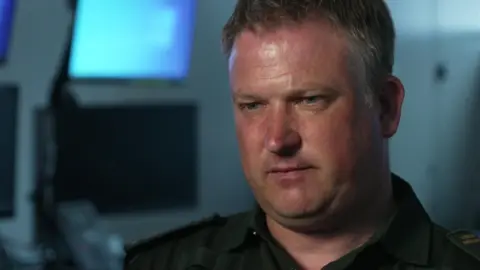
Peter Rhodes had been qualified as a paramedic for six months when he was sent in a response car to the bomb at Tavistock Square.
"There was a contact from our control room to say that there had been an explosion on a bus and would I respond to that, because the other cars in the area had been responding to the stations," the now deputy director of ambulance operations at the London Ambulance Service said.
"There were quite a few people who just didn't understand what had actually happened."
He said doctors inside the nearby British Medical Association building took in some victims of the blast.
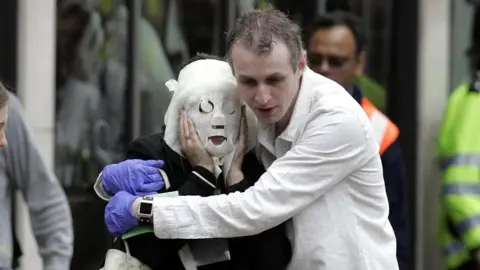 PA Media
PA Media"It's quite strange, really. It was really quiet. There were lots of people but there was a strange silence around, that's the thing I remember the most about it," Mr Rhodes said.
"It was just awful... Although you can train for these sorts of things, actually arriving and seeing it first hand and just understanding that the people there are relying on you to do your best and to be able to sort of get a grip of the situation - it's quite a thing."
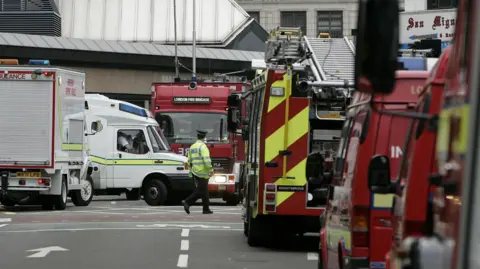 PA Media
PA MediaCraig Cassidy, who has been a paramedic with the London Ambulance Service since 1999, remembered arriving at Aldgate station and being told by firefighters that they did not believe there were any more explosive devices.
"For us that was news, because we believed it was a train derailment or a train crash - we had no idea there were any kind of explosives involved," he said.
Mr Cassidy said he remembered walking into the darkness and being met by the quiet.
"No screaming, no shouting," he said. "But phones pinging, people trying to send messages."
He said seeing fatally injured people in the tunnel was seared into his memory.
'I hope they realised they weren't alone'
"You cannot prepare for this kind of thing," he said. "You do what's in front of you, you deal with what you're presented with, knowing that you've never experienced this before, but you've got to get on with it.
"I put myself to one side. When I when I'm at work, I'm not Craig. I put my uniform on, I'm a different person, I'm a paramedic."
Reflecting on his involvement on the day, he added: "I hope I did it well. I hope I gave some comfort to some of the people. I hope they realised that they weren't alone at that point.
"I've been back to that station many times because I still work in the same area. When I go back in, it's still present with me.
"Every one of them was someone's partner, someone's wife, someone's husband, someone's son. Parents should never bury a child, and I knew that was going to be happening."
Listen to the best of BBC Radio London on Sounds and follow BBC London on Facebook, X and Instagram. Send your story ideas to [email protected]
